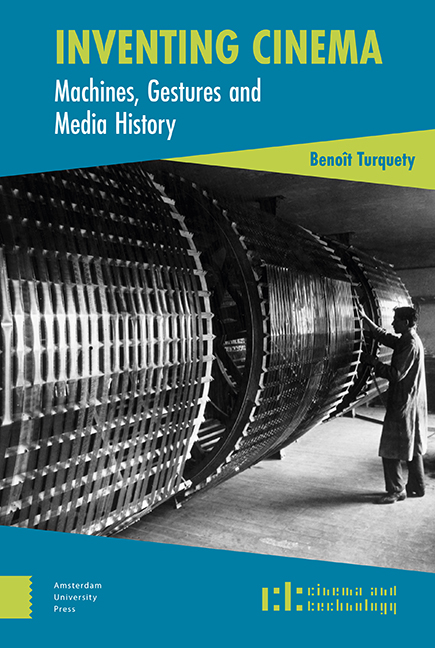Book contents
- Frontmatter
- Dedication
- Contents
- Acknowledgements
- Introduction: The Problems of Digital Cinema
- 1 The Why and How of Machines
- 2 Invention, Innovation, History
- 3 The Invention of the Problem
- 4 The Invention of the Cinématographe
- 5 ‘Natural Colour Kinematography’, a New Cinema Invention : Kinemacolor, Technical Network and Commercial Policies
- 6 Epilogue: From the Trembling of Film to the Stability of the Digital
- Bibliography
- Index
Introduction: The Problems of Digital Cinema
Published online by Cambridge University Press: 21 November 2020
- Frontmatter
- Dedication
- Contents
- Acknowledgements
- Introduction: The Problems of Digital Cinema
- 1 The Why and How of Machines
- 2 Invention, Innovation, History
- 3 The Invention of the Problem
- 4 The Invention of the Cinématographe
- 5 ‘Natural Colour Kinematography’, a New Cinema Invention : Kinemacolor, Technical Network and Commercial Policies
- 6 Epilogue: From the Trembling of Film to the Stability of the Digital
- Bibliography
- Index
Summary
Abstract
This introduction first describes the current situation in the cinema production industry and the discipline of film studies. Digital means involve new problems regarding remediation, perceptual specificities, the notion of reproducibility, or archival ethics. These transformations force us to rethink what the concept of invention means in media studies. In turn, this implies finding ways to analyse both machines and gestures.
Keywords: digital cinema, archival theory, technology, reproducibility, remediation, facsimile
This book materialized at a quite precise moment, albeit the periodization and determinations of this moment remain fairly difficult to specify. It lies in the midst of a period when ‘cinema’ is being transformed, with the gradual abandonment of its original system of analogue image and sound recording on a photo-chemical base in favour of their digital coding and storage. This evolution has not only affected cinema: it has already had an impact on music and sound recording, photography, book publishing, etc. In the case of cinema, its complexity has delayed somewhat a process that soon appeared inevitable.
This shift has shaken up every field in which cinema operates: with the creation of new professions and the transformation of existing trades; the appearance of new industries and the bankruptcy of film laboratories and motion picture camera manufacturers; companies no longer producing film stock; major transformations in the ways in which ‘copies’ of ‘films’ are distributed; profound alterations to the system's overall economy involving entirely new circulations of money; radical changes to the way moving images are consumed by viewers (on computers, mobile telephones, etc.); new problems for film archives; the list goes on and on. The scope of the transformations appears so great that our vocabulary no longer seems adequate to the task: can we still call cinematic works ‘films’ if film, meaning light-sensitive film stock, is no longer present at any point in the production, storage, or dissemination process? Can we still use the term ‘cinema’ to name what is produced or consumed in ways seemingly so different from the traditional model – or must we speak more broadly and more vaguely of moving images, of media, of expanded cinema, of ‘post-cinema’?
- Type
- Chapter
- Information
- Inventing CinemaMachines, Gestures and Media History, pp. 11 - 24Publisher: Amsterdam University PressPrint publication year: 2019



